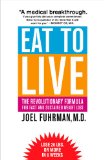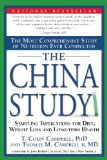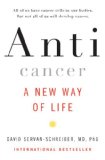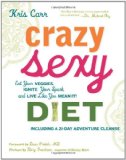
Eat to Live
I read this years ago and never quite forgot it (though for a while there, I forgot the title and couldn't find the book again, much to my dismay). Dr. Fuhrman is plain-spoken, inspiring, and undeniable. His orientation is primarily toward weight loss, and his plan makes it easy. But it's not just about how you look. Dr Fuhrman cites so much compelling evidence that this is the healthiest way to live. Like I said, it's inspiring. It's his book that got me started reading the books that follow. I highly recommend this as a good place to start.

The China Study
I learned about this book from the previous author, and couldn't put it down. Not only does this book lay out the findings of major worldwide studies on the connection between diet and disease, but it also details the not always stellar politics of governmental health organizations where the author held advisory positions. If you pick no other book from this list, I recommend this one.

Anticancer, A New Way of Life, New Edition
This book picks up where T. Colin Campbell leaves off. Written by a doctor and cancer survivor, this book goes deep into the most recent evidence for the connection between diet, lifestyle and disease and how our bodies specifically benefit from what we normally identify intuitively as simple, healthy choices.

Crazy Sexy Diet: Eat Your Veggies, Ignite Your Spark, and Live Like You Mean It!
Yup, I'm recommending it. This is the book that takes you by the hand and leads you down the scary path of letting go of the bad habits and introducing the good. My copy just arrived a few days ago. I'm happy that I bought it.
Do you know about Kris Carr? Perhaps you've picked up on a little of the complicated feelings I have about the "Crazy Sexy Life" movement she spearheaded beginning with her 2003 documentary, "Crazy Sexy Cancer." The healthy and active life choices she promotes, including a largely raw foods, vegan, sugarless diet, were exactly the choices I was passionately embracing when I received my cancer diagnosis. It's not the lifestyle that bothers me.
Nor is it the philosophy. Life is crazy, in all the positive and the negative connotations of the word. And at its innermost vibrant core, the energy of life is also sexy. Life begets life. For our species anyway, sex is how it's done.
And yes, I think it's good to recognize that people with cancer are still fully human. We don't want to be relegated to pedestals of tragic passive ethereal delicacy. We don't want to be regarded as saints or heroes. We don't want our struggle to be glossed over or glamorized. We just want to live.
So where's the problem? It's not Kris Carr herself. Though she is accused of it by those who don't read beneath the surface of her titles, I do not believe she glamorizes cancer. Although I'm jealous of the fact, it's not that, for her, a "wait and watch" regimen of healthy living bolstered by daily wheat grass shots and regular colonics (aka "high enemas") were a reasonable, oncologist-sanctioned treatment plan. (Just to clarify, my jealousy does not extend to the colonics. I have never had a colonic and the idea of one most definitely freaks me out.)
The thing that gets me is, it worked. Her tumors shrank.
Which means I can't bring myself to walk away from the ideas. Which makes me notice that lately, I kind of want to.
There is so much in the media right now about how to prevent cancer with diet and exercise that it makes having cancer feel like a giant humiliation of bad lifestyle choices. I know it's not so simple. I know it's not my fault. But I hate feeling like the world might see it that way. I understand the temptation. I've been on the other side of this scary fence hoping to stay there, wanting to believe it was under my control. Even today I was lectured about what kind of cleaning products I should be using from a well-meaning loved one theorizing about the sources of breast cancer. Never mind that all I use is vinegar and water. Never mind the sexist implications of this theory. Never mind that the lecturer was a smoker.
We as a society have so little attention for addiction. I feel for folks with lung cancer. Do they receive the compassion they deserve?
But I digress...
It's very easy to get caught up in thinking that every non-impeccable choice I'm making, dietary and otherwise, is paving the way to my own demise. It doesn't help that chemo has rendered my mouth hypersensitive to texture and desensitized to flavor. Therefore, meat, fat, starch, and sweets have become much more appealing. Salad, previously a twice-daily pleasure, has become a challenge.
But here it is, the bottom line: I'm done whining about it. I'm done wallowing in self-pity and frozen treats. Temptations will always be there, cancer or not. I can refuse to blame myself for my disease without denying that my choices impact my health. I'll be gentle with myself of course. But I'm done holding back from my most vibrant life.

6 comments:
I was wondering how it worked out that you were so fit with such good eating habits and still got cancer.
You are a wonderful example of facing challenges head on.
Interesting book "The China study",
You'll lick the cancer Amy, keep your head up!
Jane
I totally get what you are saying, but there's another huge factor here that plays a role in turning on cancer genes--the environment. We all get huge dioxin hits ans xenoestrogen exposure every day. We are full of plastics (xenoestrogens). It's in everyone's fat now. Polar bears are becoming hermaphroditic because of extremely high levels of environmental pollutants.
Definitely, eat an anti-cancer diet and live an anti-cancer lifestyle, but also don't neglect the most obvious trigger---the environment. I'd say people need to work on education about living *green* and focus on lobbying for environmental legislation.
Sorry, but it's the elephant in the living room no one wants to talk about. I bet someone reading this now is taking sips out of a plastic water bottle.
Here's some basic bisphenol information:
http://greentot.wordpress.com/2008/06/25/bisphenol-a-bpa-fact/
Here's a great link too with a body map (I like visuals) that talks about the variety of environmental toxins: http://www.ecologycenter.org/erc/petroleum/body.html
And here's some news about plastics in the ocean: http://www.sciencedaily.com/releases/2010/03/100323184607.htm
I think r3 is right on regarding the environment. There is a huge mass of information how to "prevent" cancer through things we can control but the reality seems to be that we as individuals can't control it. I believe the rate of cancer now vs. 30 years ago has got to be substantially higher. Why? Environment.
We all should be scared sh*tless. Maybe that's why the books that encourage us to think we can "prevent" cancer sell so well. They lead us to believe we have the control we really don't have.
I am a runner and a swimmer and am lean and try for a healthy diet. I drink no alcohol and never smoked. I feel very vulnerable even so. No one is safe.
Such good comments, thank you! I should add another book to my reading list, Living Downstream by Sandra Steingraber. I will mention it in my next post.
Can I add another book to your list? When I was first diagnosed, I read Siddhartha Mukherjee's Emperor of All Maladies: A Biography of Cancer http://www.amazon.com/Emperor-All-Maladies-Biography-Cancer/dp/1439107955
It's kind of a tough read, but he examines the very long history of cancer, as well as the politics of research and treatment.
While we might like to think we can control cancer--prevent it or cure it--it has been around a long, long time. If a "clean" diet is all that is required to prevent or shrink tumours, why did people still get cancer so many years ago when there was no such thing as processed or refined foods?
Is it possible that the incidence of cancer in the population has increased at least partially because we live longer than ever before in history? Once upon a time, I might not have lived to 50yo and would never have developed cancer.
I do agree that we should all clean up our diets and pay attention to the environment. We've gotten into some hazardous habits in our society. But I disagree with the notion that we actually have the power to prevent cancer. It implies that those of us who do have cancer somehow deserve it, or at least did it to ourselves.
Post a Comment